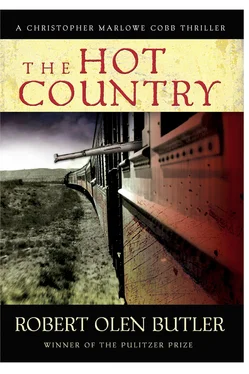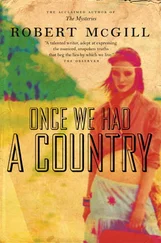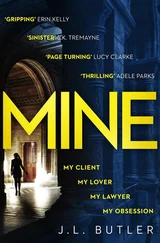Now it was a matter of my sprinting toward the south side of the customs building before the two men from the Ypiranga emerged from the far side of the storehouses. I took off. I made it to the Custom House and around to the southern edge facing the city, and I took up a spot behind the man-high plinth at the base of one of the front decorative columns. I had a good, mostly hidden view down Avenida Zaragoza, which they would have to cross.
And soon they emerged, less than a hundred yards from me. I picked them up in my binoculars. They didn’t cross Zaragoza; instead they turned south on it. I came out of the shadows and followed well back. When they stopped up ahead, at the corner of Esteban Morales, I stopped too, and I was worried about them seeing me standing here, fifty yards back and all alone in the street, but they seemed sublimely, obliviously confident in their secretiveness. The talk was apparently about directions, because they pointed up Esteban Morales and conferred and pointed on down Zaragoza and talked some more, and then finally they headed up Esteban . As soon as they did, I figured I knew where they were heading.
This was confirmed a few blocks up when they vanished south on Cinco de Mayo . I came up quickly to that corner and I took the last step carefully to pause and watch. As I expected, halfway up the block the two men stopped in front of a wide, two-story brick-and-adobe house of the sort that had a deep back gallery of rooms around a courtyard. I’d noted the place on my basic lay-of-the-town reconnoiter on my second day. This was the German Consulate. The small man knocked, and when the door opened, he handed the bag inside and the tall man did a simple aristocratic bow of thanks — no handshake — and he went in and the door shut in the small man’s face. Before he could even turn to head back to his ship, I was hustling down the street to get out of sight.
The tall man was clearly someone very important. Straight from the Fatherland and keeping a low profile. I could smell a story here as sure as I could smell the old-fish-and-salt-wind smell of the harbor before me. This wouldn’t be an easy one, but I always had half a dozen tough stories kicking around in my head at any given time. This one sure couldn’t be any tougher to deal with than an invasion that stopped a mile inland and promised to turn into civic planning and sanitation work. Not any tougher, either, than a girl sniper with a roughhouse sense of humor.
A very few hours later I was in the portales of the Diligencias having my morning coffee straight and sludge-thick to wake up from my little stroll in the middle of the night, thinking about how to get at the tall man sequestered in the German Consulate, when there was a lone gunshot straight across the zócalo . Somehow I knew it was her. The Palacio Municipal, City Hall, another symbol of corruption to the revolutionaries, sat massively over there beyond the trees and just the one shot was fired. And though I was sure of the direction, the shot sounded farther away than the edge of the Plaza. I gathered up the cable blanks I’d been filling with nothing-happening tripe and I put down some coins, and I saw Davis, a few tables to my left, standing too. He was ready for a new day as Richard Harding Davis, crack but elegant War Correspondent, in starched and pressed field togs and gray felt hat with a blue polka-dot puggaree, symbol of the Rough Riders, of which he was an honorary member for having turned them and their Hearstian war into romantic heroes to be heralded by every newsboy on every street corner in America. He was putting the proper tilt to the hat as I looked at him, and he picked up his riding crop, the final touch. He glanced my way. He nodded at me and I nodded at him, and by the time we hit the avenida we were shoulder to shoulder and moving briskly together, heading for City Hall.
“Cobb,” he said.
“Davis,” I said.
“You understand my usually keeping my distance?”
“Of course,” I said.
“Out of respect,” he said. “Your work in the Balkans — and in Nicaragua before that — was splendid. Did you get my notes?”
“I did,” I said. And though Davis’s style irritated me, I had his lengthy handwritten notes tucked in a drawer in my desk in Chicago. This was true of the man: He was famous for his frequent, generous, handwritten praise of his colleagues, be they newsmen or novelists. Though one of my criticisms of him was that he played a little too frequently at being the latter, the excesses of novels too often finding their way into his work as the former.
“Ironically,” Davis said, “if I didn’t have good reason to write those notes, I would be more inclined to dine with you. We do find ourselves working for the same beats.”
“How sad,” I said, “that we now find ourselves chasing single gunshots.”
“Though at least it sounded like a Mauser,” Davis said.
To an attentive ear, quite a different sound from our boys’ Springfield 03s. A sniper, he was suggesting. I kept my mouth shut.
“No matter,” Davis said. “We’ll all be in Europe soon enough, I wager.”
“I wouldn’t wager against that,” I said, and we both seemed to realize that we were losing our focus. If we didn’t pick up the pace, we might as well go back to our coffee. So we fell silent and pressed on faster, around the band shell and through the trees and across the pavement before City Hall, an old Spanish building with its portales occupied now by cookstoves of the Second Infantry regiment.
“He’s got guts, plugging away at our boys where they camp,” Davis said.
Though most of the regiment at this hour was out patrolling at El Tejar, our western perimeter, what Davis said made me doubt for a moment that this was the woman sniper, a doubt that recurred when we came around the corner of the palacio . I saw a dozen or so of our boys on the case, a few in the street pointing toward the bell tower of La Parroquía, a few breaking off in both directions to circle the church and maybe catch the shooter coming out, a few others surrounding the victim. This was some local hombre gunning for an American soldier.
But when Davis and I arrived at the victim, I figured I better rethink things. It was the utility commissioner who’d decided to work with the Americans. He was sitting there on the pavement in his serge suit and with his Panama hat upturned a few feet away, and he and one of our boys were both pressing a wad of bloody cloth to the center of his face, the commissioner gasping his breaths through his mouth.
“What happened?” Davis said.
A sergeant standing next to us said, “Somebody shot the guy’s nose off. Clean as a whistle.”
Davis humphed. “You boys were hunting a man with a Mauser and a message.” With the alliteration, he turned his face and looked me straight in the eyes. He was already shaping his lead and he had just staked his claim to the phrase.
I, however, was in the midst of realizing that I’d once again underestimated our local soldadera . This clearly bore her signature. If Davis filed a piece on the guy with the Mauser and the message, I could beat him quite handily with my girl and a gun.
But I suddenly found myself concerned for her. I moved off quick to trail one of our little search parties around the church. By the time the two parties of infantrymen met up on the opposite side, on Calle de Vicario, almost in the exact same spot where the plugged priest lay yesterday, I was thinking these boys were wrong about where the shooter was. The angle from the bell tower was too difficult to shoot off a man’s nose. And shooting off his nose was exactly what she’d intended to do. I didn’t know where she was, but it wasn’t the campanario .
Читать дальше












